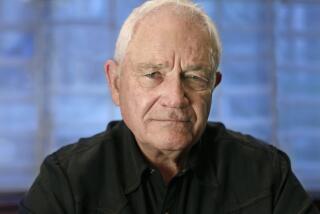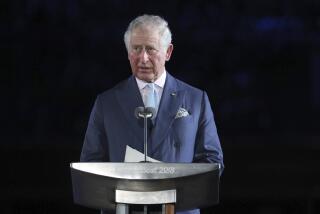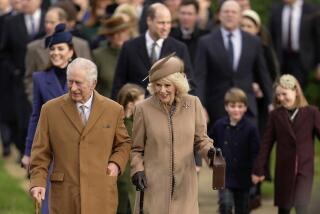The Man Who Wouldn’t Be King : KING EDWARD VIII: A Biography <i> By Philip Ziegler (Alfred A. Knopf: $24.95; 480 pp.) </i>
Some of us are old enough to know that there was another December day, in 1936, as vividly etched in memory as the Sunday Pearl Harbor was bombed: the day King Edward VIII of England, the handsome, popular Prince Charming of modern times, announced that he found it “impossible to carry the heavy burden of responsibility and to discharge my duty as king as I would wish to do, without the help and support of the woman I love.” Glued to the radio, the whole world swooned.
He should have vanished then, in a puff of smoke, before we opened our eyes. Instead, with the whole world watching, he had to live happily ever after--a burden that proved heavier than the crown.
His story has been told before, but for this new biography Philip Ziegler has tapped an ocean of fresh material: previously secret documents, Edward’s diaries, the 2,000 love letters, thought to have been destroyed, that he wrote to Freda Dudley Ward before “all other luminaries were dimmed by the solar splendour of Mrs. Simpson.”
Ziegler’s elegantly written account recreates the suspense when Edward left the throne. He guides us through the intricate tangle of law, tradition, ceremony and mystery that binds Britain to its monarchy, and binds the monarchy to unspoken but rigid rules.
In a sense, being born royal doomed Edward from the start. When he entered the world in 1894, the eldest son of the eldest surviving son of the eldest son of the Queen Empress, his grandfather was still Prince of Wales--and had been Prince of Wales for more than 50 years. Edward’s father, then the Duke of York, had to wait out the entire reign of Edward VII before he could ascend the throne as George V. So the young prince was slated to spend his whole life in training for a job opening that was still two generations away.
The ceremonial aspects could have choked him in his crib. At his christening, he was not only surrounded by 12 godparents, mainly German, and a cake 30 inches high and five feet wide, he also was saddled with seven first names: Edward Albert Christian George Andrew Patrick David. His family settled for David. A few friends could call him “Eddie.” As king he was Edward and as ex-king, of course, he was busted to Duke of Windsor, a title they had to invent for the occasion, but he liked the sound. Ziegler supplies a “Nomenclature” section in this book to help you sort this all out.
Having survived to the age of 12, the Prince was bundled off, scared, friendless and homesick, to the Royal Navy, a popular holding ground for royal sons, Ziegler writes, as it offered few chances for debauchery and leaned hard on sobriety, self-reliance, punctuality, respect for authority, instinct to conform and other kingly virtues. For all its restraints, it beat the fun life around Buckingham Palace, the Prince felt, and he would happily have stayed there and made it his career.
Unfortunately, a stretch at Oxford was required--”an awful situation,” he wrote his brother Bertie, “and I only wish I was back quietly in the only service--the navy.” He was painfully shy, but people liked him, as he put on no royal airs and yearned to pass unnoticed in the crowd. “He no wear feather in for him hat,” as a local in Gambia purportedly said when the Prince passed by on tour.
“Oh!! That I had a job,” came to be the metaphor of his life. He briefly joined the Grenadier Guards, but when they marched off to the First World War he had to stay behind. “I have to stay at home with the women and children,” he moaned. “Surely a man of 20 has higher things to hope for?” He finally made it to France, but was seldom allowed near the front. “I do hate being a prince and not allowed to fight!!” he wrote a friend. Lord Desmond Fitzgerald, one of the few who were invited to call him “Eddie,” wrote him on his birthday that year: “The only thing I know of that you would really like, I cannot give you, and that is that you would become an ordinary person.”
The brief wartime chances to slip his leash gave way to a bone-crushing succession of royal tours that consumed the next 30 years of his life. By October of 1925, he had visited 45 different countries and colonies and traveled 150,000 miles. The strain began to tell. He was often on the verge of collapse. He drank and smoked too much, slept and ate too little, compulsively exercised.
“Oh!! to be out here privately and not as the P of W,” was a recurring lament. “That’s what ruins my life and ever will!!!!” Yet in public he exuded a combination of modesty and charisma that transfixed the crowds wherever he went.
He sensed this power, but it never quite went to his head, especially since his father, the king, rarely missed a chance to tell him what he’d done wrong, even if it was only wearing too light a jacket to church. His crowd-pleasing potential was to haunt the monarchy and the government when he left the throne. He was a loose cannon, careening crazily outside the gates. What if he should try to come back?
On one track, Ziegler paints the portrait of a man unusually qualified to be king, with an awareness of the privations of the homeless and unemployed. Yet in the next breath, he could be insensitive and obtuse, as in his notorious contacts with Nazi Germany. He seemed to have the attention span of a flea.
He was the first prince to mingle with the common man, as Ziegler says, but he “could never shed the prejudices of his caste and generation.” He readily abandoned the throne, but fought bitterly with his successor to retain his royal perks and pay and titles and, above all, to have them shared by his wife. He was trained to be a king, and vague and ephemeral as it is, it remained to his death the only trade he knew.
What it was about Mrs. Simpson that so knocked the king for a loop, Ziegler is at a loss to explain. Certainly, all that had led up to their meeting predisposed him to madness: exhaustion from his tours, poor eating habits, smoking, drinking, punishing exercise, frustration, isolation from his staff, family criticism at every turn, depression. Perhaps the madness took the form of obsessive passion. No one knows to this day how much she cared about him. It didn’t seem to matter. He had “done the one all-important thing,” Ziegler concludes: “He had rejected the stultifying trammels of a career which he detested to secure the greatest of human joys, the total commitment of himself to another being.”
He missed the honor roll in the long line of British sovereigns, but viewed as a frail mortal, blundering about the planet like the rest of us, he achieved a certain mournful grandeur in the sacrifices he made for the woman he loved, whether or not she was worth it.
More to Read
Sign up for our Book Club newsletter
Get the latest news, events and more from the Los Angeles Times Book Club, and help us get L.A. reading and talking.
You may occasionally receive promotional content from the Los Angeles Times.









